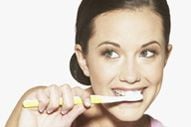 Brushing is the most effective method for removing harmful plaque from your teeth and gums. Getting the debris off your teeth and gums in a timely manner prevents bacteria in the food you eat from turning into harmful, cavity causing acids.
Brushing is the most effective method for removing harmful plaque from your teeth and gums. Getting the debris off your teeth and gums in a timely manner prevents bacteria in the food you eat from turning into harmful, cavity causing acids.
Most dentists agree that brushing three times a day is the minimum; if you use a fluoride toothpaste in the morning and before bed at night, you can get away without using toothpaste during the middle of the day. A simple brushing with plain water or rinsing your mouth with water for 30 seconds after lunch will generally do the job.
Brushing techniques
Since everyone's teeth are different, see me first before choosing a brushing technique. Here are some popular techniques that work:
- Use a circular motion to brush only two or three teeth at a time, gradually covering the entire mouth.
- Place your toothbrush next to your teeth at a 45-degree angle and gently brush in a circular motion, not up and down. This kind of motion wears down your tooth structure and can lead to receding gums, or expose the root of your tooth. You should brush all surfaces of your teeth - front, back, top, and between other teeth, rocking the brush back and forth gently to remove any plaque growing under the gum.
- Don't forget the other surfaces of your mouth that are covered in bacteria - including the gums, the roof and floor of your mouth, and most importantly, your tongue. Brushing your tongue not only removes trapped bacteria and other disease-causing germs, but it also freshens your breath.
- Remember to replace your brush when the bristles begin to spread because a worn toothbrush will not properly clean your teeth.
- Effective brushing usually takes about three minutes. Believe it or not, studies have shown that most people rush during tooth brushing.

